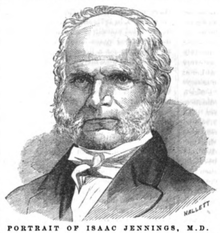Isaac Jennings | |
|---|---|
 | |
| Born | November 7, 1788 |
| Died | March 13, 1874 (aged 85) |
| Occupation(s) | Physician, writer |
Isaac Jennings (November 7, 1788 – March 13, 1874) was an American physician and writer who pioneered orthopathy (natural hygiene).
Biography[edit]
Jennings was born on November 7, 1788, in Fairfield, Connecticut.[1] He studied medicine with Eli Ives of New Haven. He was licensed to practice medicine and located himself in Trumbull, Connecticut.[1] He moved his practice to Derby, Connecticut, in 1820. Jennings graduated from Yale School of Medicine in 1812.[2] He obtained his M.D. from Yale in 1828.[1]
Jennings practiced conventional medicine for many years but became discouraged with its results. In 1822, Jennings began to give his patients without knowledge, placebos of bread pills and coloured water tonics.[3] His patients health improved but caused controversy when his secret was revealed and his patients requested medicine.[4] He refused to prescribe medicine and his career was damaged.[4] It was noted that "his unorthodox view involved him in many controversies and diminished his practice to some extent."[5] The experiment convinced him that drugs were worthless and by the 1830s, he even discarded placebos. He believed that only nature could "restore her damaged machinery and revitalize it."[2] He described medicine as a "gross delusion".[6]
In 1839, he became a member of the Board of Trustees of the Oberlin College.[7] In 1847 at the college, he wrote his book Medical Reform.[7] In his 1867 book The Tree of Life, he defined orthopathy as "from orthos, right, true, erect; and pathos, affection. Nature is always upright—moving in the right direction."[2] His system of orthopathy was known as the "do-nothing cure", "do-nothing mode of treating disease", "let alone plan" and the "no-medicine plan".[3][8] He prescribed bathing, rest and a vegetarian diet as part of his system.[4][9]
His no-medicine plan was based on the idea of vitalism.[10][11] He believed that nature does its best to keep the human system in health and to give the best opportunity for the "vital forces" to work, the patient must rest and not be disturbed by medicine or stimulants.[11] He was a congregationalist and deacon in Derby and Oberlin.[1] Jennings was a temperance activist and opposed the use of alcohol and all drugs. He was a vegetarian and opposed the consumption of coffee, tea, tobacco, meat and spices.[1] He considered the use of coffee and tea to be injurious and a "great sin in the church".[9]
In 1867, the Buffalo Medical and Surgical Journal described Jennings' methods of utilizing bread pills as "down right quackery and imposition" and a "disgrace to the regular profession".[12] A review of his book The Tree of Life suggested it was "without a particle of merit" and the ideas would not be popular with people of the present day.[13]
Jennings died of pneumonia on March 13, 1874, in Oberlin, Ohio.[1]
Jennings influenced many natural hygienists including Felix L. Oswald, Russell T. Trall, Herbert M. Shelton, Hilton Hotema and many others. He has been listed as a father of the hygiene movement.[14]
Publications[edit]
- Medical Reform: A Treatise on Man's Physical Being and Disorders (1847)
- The Philosophy of Human Life (1852)
- The Tree of Life: Or, Human Degeneracy, its Nature and Remedy: Based on the Elevating Principle of Orthopathy (1867)
See also[edit]
References[edit]
- ^ a b c d e f Orcutt, Samuel; Beardsley, Ambrose. (1880). The History of the Old Town of Derby, Connecticut, 1642-1880. With Biographies and Genealogies. Press of Springfield Printing Company. pp. 601-603
- ^ a b c Whorton, James C. (2016 edition). Crusaders for Fitness: The History of American Health Reformers. Princeton University Press. pp. 135-136. ISBN 978-0691641898
- ^ a b Lelieveld, H. L. M; Holah, John; Mostert, M. A. (2005). Handbook of Hygiene Control in the Food Industry. Woodhead Publishing Limited. pp. 3-4. ISBN 978-1-85573-957-4
- ^ a b c Iacobbo, Karen; Iacobbo, Michael. (2004). Vegetarian America: A History. Praeger Publishing. pp. 28-29. ISBN 978-0275975197
- ^ Coyle, William. (1962). Ohio Authors and Their Books. The World Publishing Company. p. 339
- ^ Anonymous. (1867). The Tree of Life, or Human Degeneracy: Its Nature and Remedy as Based on the Elevating Principle of Orthopathy. Dental Cosmos 9: 224.
- ^ a b Hoff, Hebbel E. (1961). Isaac Jennings and the Magic Bullet. Bulletin of the History of Medicine 35 (1): 71-73.
- ^ Oswald, Felix L. (1881). Physical Education. The Popular Science Monthly 19: 596.
- ^ a b Fletcher, Robert Samuel. (1943). A History of Oberlin College From its Foundation Through the Civil War. Oberlin College. p. 332
- ^ Anonymous. (1867). The Tree of Life: Or Human Degeneracy: Its Nature and Remedy, as Based on the Elevating Principle of Orthopathy. The Medical and Surgical Reporter 17 (13): 271.
- ^ a b Fletcher, Robert Samuel. (1943). A History of Oberlin College From its Foundation Through the Civil War. Oberlin College. p. 334
- ^ Anonymous. (1867). Orthopathy and Dr. J. Jennings. Buffalo Medical and Surgical Journal 7 (5): 193-194.
- ^ Anonymous. (1867). The Tree of Life: Or Human Degeneracy, its Nature and Remedy, as Based on Elevating Principles of Orthopathy. Saint Louis Medical and Surgical Journal 4 (6): 578.
- ^ Lloyd, Iva. (2009). The History of Naturopathic Medicine: A Canadian Perspective. McArthur & Company. p. 386. ISBN 978-1552787786